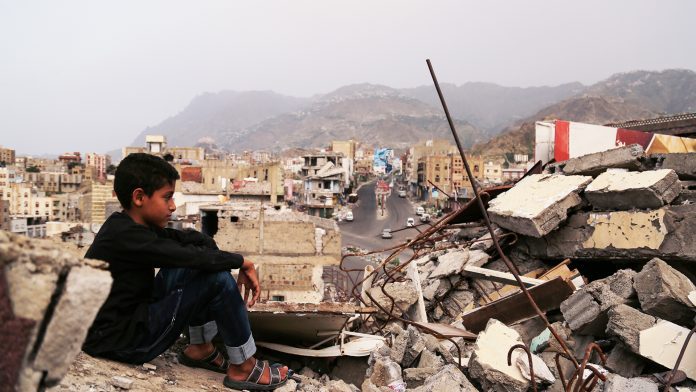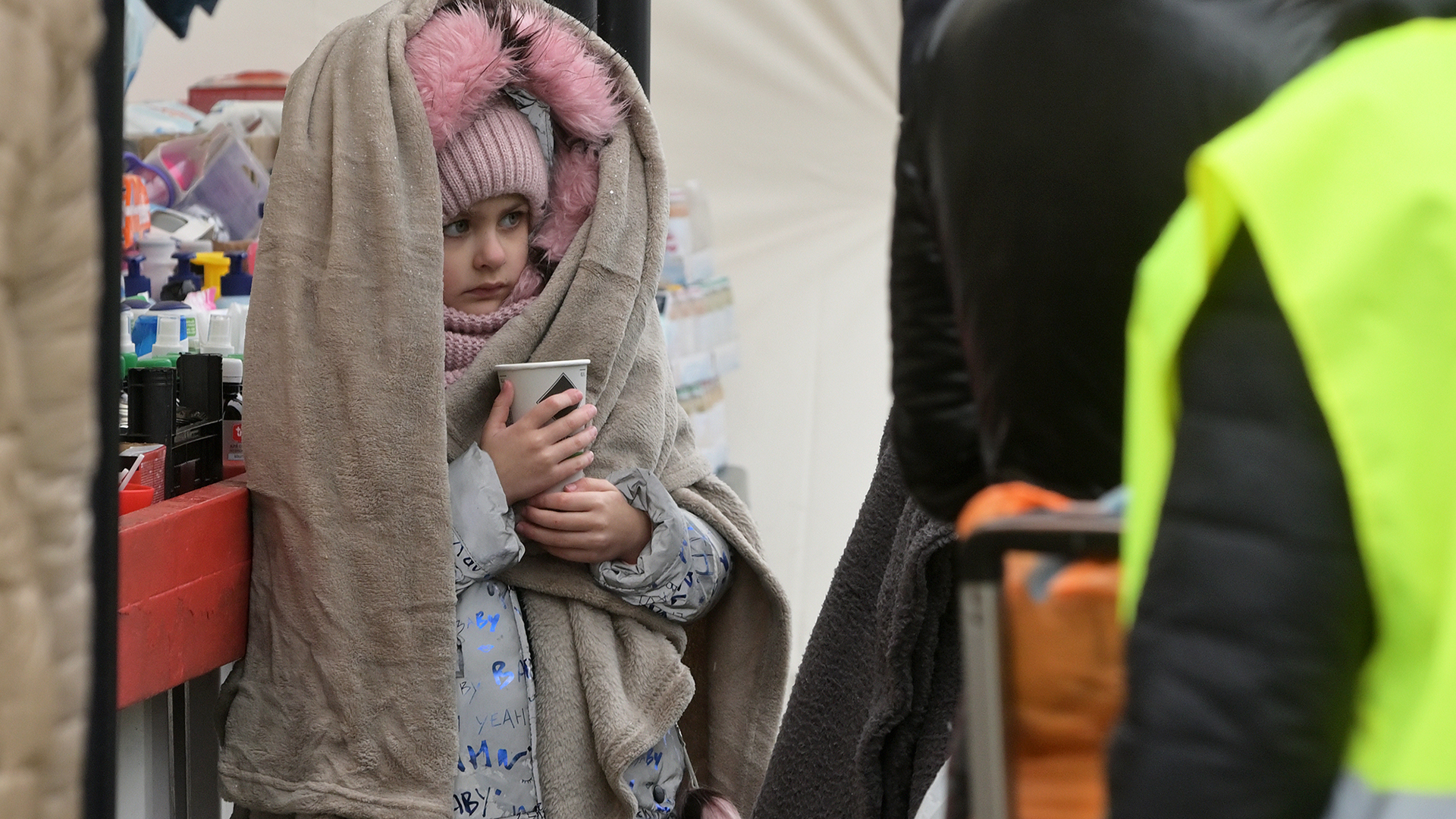
Aaron Greenberg, Senior Regional Advisor for Europe and Central Asia at UNICEF, spoke to us about how exposure to crisis situations can impact children’s mental health and wellbeing.
Experiencing the terrors of war can be difficult for many people to imagine. Crisis situations comprising armed conflict, separation from loved ones and forced displacement can leave people with physical and emotional burdens that, if not suitably addressed and supported, can continue to impact their wellbeing throughout their lives. For children, emergency situations can be even more traumatic and put them at risk of long-term mental health problems. The provision of child protection services and psychosocial support is therefore vital.
Providing children in emergency settings with safety and support is part of the United Nations Children’s Fund’s (UNICEF’s) remit; the organisation works in over 190 countries around the world to protect vulnerable children and safeguard their physical and mental health. They run one of the largest humanitarian responses on Earth and, in 2021 alone, they helped provide mental health support for 12 million children and care givers. To discuss how humanitarian crises can impact children’s mental health and wellbeing, Lorna Rothery spoke to Aaron Greenberg, Senior Regional Advisor for Europe and Central Asia.
How prevalent are mental health issues among children in conflict-affected populations and settings?
While a physical injury is immediately visible, a mental wound can sometimes remain invisible and consequently, children’s mental health issues may remain undetected and underprioritised in conflict-affected settings. Exposure to violence, destruction and loss of loved ones can manifest in children through reactions such as depression, nightmares and difficulty sleeping, aggressive or withdrawn behaviour, sadness and fear, among others.
Prevalence of mental health issues can be hard to establish in conflict-affected populations and estimates often vary. The World Health Organization (WHO) estimates that 22% of conflict-affected people suffer from a mental health disorder. We know that children are at serious risk and that chronic exposure to conflict-related violence and other stressors can increase the likelihood of mental health reactions. At the same time, children and families are resilient, and with basic support, many can recover from these reactions once they are safe, have their basic needs met, and have access to social and community support.
How can exposure to crises including armed conflict and forced displacement impact children’s mental health and wellbeing in the short and long term? What are some of the common mental health conditions they can develop? Does this vary across age groups?
During conflict, both children and adults can experience extreme stressors, such as exposure to violence, injury, illness, displacement, loss of loved ones, homes, income, and insufficient access to basic needs such as food, water, and shelter. In some cases, children are orphaned or separated from parents or caregivers due to displacement or caregivers joining the military. Education and daily routines are very often disrupted. Parents and other caregivers often struggle with their own mental health reactions, which can in turn affect their ability to care for their children.
In some cases, these stressors can have a catastrophic impact on children’s behaviour and emotions, as well as on their learning and development in the short and long term. It is possible that the mental wounds of conflict could affect children well into adulthood.
Children react to stressful experiences in different ways, but some common reactions include physical problems like headaches and stomachaches, fear and worry, difficulty sleeping and nightmares, and difficulty concentrating. Some children may engage in aggressive behaviours, others may be socially withdrawn. It is common for reactions to shift over time. Young children may return to behaviours they used when they were younger, such as bedwetting, crying, and clinging to parents. Displaced adolescents may have lost friends and important social identities, and may experience symptoms of anxiety and depression, poor school performance, and engage in unhealthy coping strategies such as alcohol and drug use and other risk-taking behaviours.
What psychosocial support is available to children exposed to humanitarian emergencies? Is there a risk that these services can decrease in efforts to address other fundamental needs such as the provision of food and shelter?
Failure to address mental health and psychosocial issues among children affected by conflict can hamper their emotional and physical health as well as their social development. I do not see the provision of mental health and psychosocial support as less important than providing a child and his/her family with shelter and food. On the contrary, mental health and psychosocial support should always be an integral part of any response that aims to ensure children’s optimal development and wellbeing in emergencies. Moreover, it is important to integrate a mental health and psychosocial support lens into the delivery of services designed to meet basic needs such as food or shelter – for example, ensuring that food distribution uses methods that are empowering, participatory, and promote dignity.

Mental health and psychosocial support programmes in emergencies should include a variety of services tailored to needs, age, and context. Programmes should ensure access to basic needs and safety, strengthening community and family supports, as well as access to individual, family, and group activities provided by teachers, doctors, and mental health and psychosocial support service providers. This support should provide nurturing care, build resilience, and especially for older children and adolescents, provide opportunities to voice their concerns and help them realise their own agency. Youth with persistent mental health difficulties that significantly impede their ability to function (e.g. attend school, engage with friends and family) may benefit from referral to specialised mental health care provided by a trained professional. Support should also be provided to parents and caregivers to help them to develop coping skills to manage their own distress related to conflict and displacement, and help them better support their children’s wellbeing.
What are the key challenges regarding mental health and psychosocial interventions for children exposed to humanitarian emergencies? To what extent do response efforts focus on the prevention and management of long-term mental health impacts such as enabling parents and carers to help a child through a mental health crisis?
Mental health and psychosocial support services have long been underprioritised and underfunded in humanitarian responses.
The COVID-19 pandemic has helped demonstrate the long-term impact and cost of underinvesting in mental health and psychosocial support. In 2021, UNICEF published a ground-breaking report on the mental health of children, adolescents and caregivers in the 21st century, and called for commitment, communication and action as part of a comprehensive approach to promote good mental health for every child.
It is paramount that mental health and psychosocial support is considered a cross-cutting priority in all humanitarian responses and is integrated into programming across child protection, health, education and other sectors. Investment in initiatives to strengthen the capacity of service providers and national and community-level health and social systems is critical. Equitable partnerships with government and civil society partners are key to delivering sustainable and socially and culturally appropriate mental health and psychosocial support programmes.
Mental health and psychosocial support services in humanitarian contexts should always target children and their caregivers. Living through conflict and displacement puts parents and other caregivers under enormous mental and emotional pressure. Caregivers must prioritise their own wellbeing in order to be able to care for their children. Access to mental health and psychosocial support can help caregivers to provide the protection, stability and nurturing care their children need during and after an emergency.
Can you share some examples of how UNICEF is currently investing in care for children exposed to humanitarian emergencies?
Mental health and psychosocial support to children, adolescents, caregivers, families and the wider community is integrated into every emergency response deployed by UNICEF globally. Some of the activities we implement include:
- Setting up safe spaces that provide regular, structured activities to help children and adolescents develop skills to deal with crises, solve problems, regulate their emotions, and form and maintain relationships. This could be through peer-to-peer groups, recreational activities, sports, and life skills and vocational training;
- Providing direct individual, group, and family support or referring children to further specialised care;
- Providing mental health and psychosocial support to teachers and other service providers, and focused care for distressed parents and caregivers through initiatives like Psychological First Aid, parent education programmes, and peer support groups;
- Helping parents and caregivers develop the knowledge and skills to support children in distress; and
- Providing training and mentorship to strengthen the capacity of local mental health and psychosocial service providers, teachers, health workers, and other community providers to support the mental health and psychosocial wellbeing of children and caregivers in emergencies.
In Europe and Central Asia, UNICEF is on the ground to respond to the needs of children and their families affected by conflict and natural disasters. One good example would be our work in Ukraine and countries hosting refugees from Ukraine. UNICEF has reached over 3.3 million children and caregivers with mental health and psychosocial support in Ukraine, and 1.2 million children and caregivers in refugee-hosting countries.
This article is from issue 25 of Health Europa Quarterly. Click here to get your free subscription today.






















